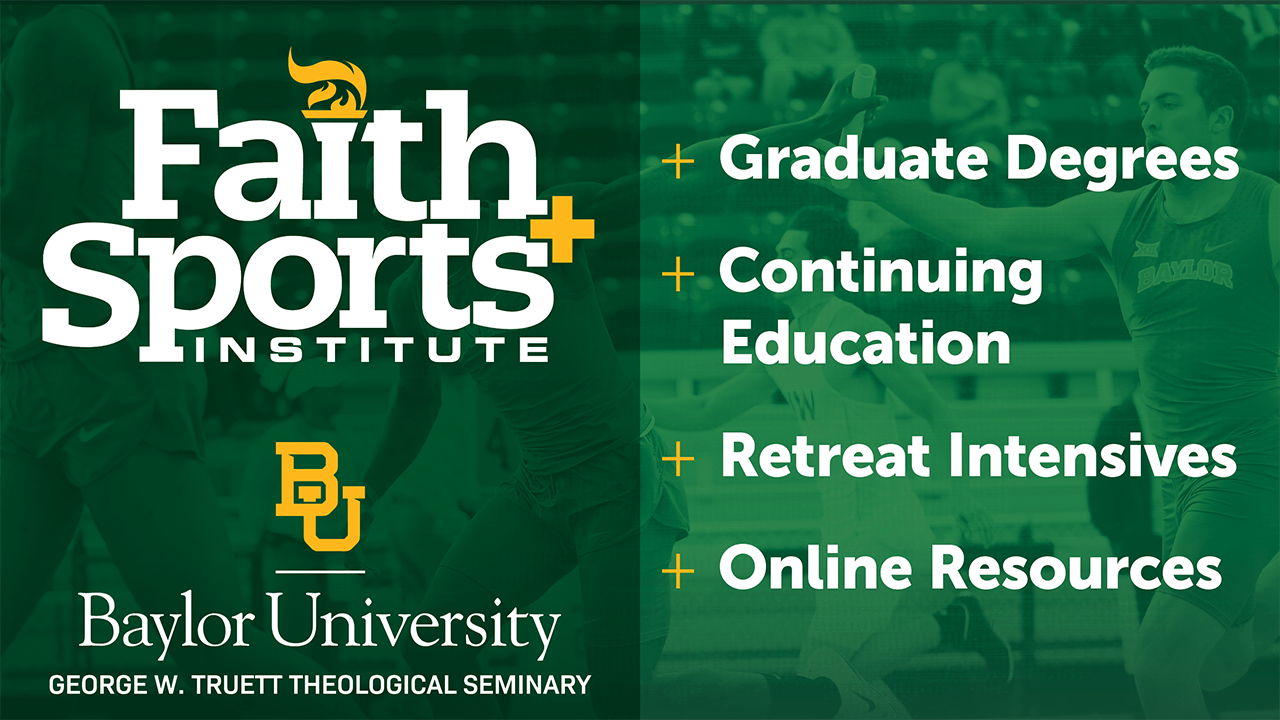Editor’s note: This guest post comes from Joshua Ehambe, a graduate student in the Sports Ministry Program at Truett Seminary.
Joshua Ehambe
Most athletes who make it to the collegiate level and beyond start competing at a young age. Even before they’re out of elementary school, sports become a way of life. Some might play multiple sports. Growing up I had friends who would play basketball in the spring, soccer in the summer, and football in the fall. Or they might start to specialize in one sport early on. I had other friends who traveled the nation year-round for AAU basketball tournaments and camps, often missing school so that they could focus on their athletic pursuits.
These athletes get into sports for multiple reasons. Perhaps their mother or father played soccer and they are following a family legacy; perhaps they picked up a football one day and developed a love for the game. Or maybe they began playing a sport because their parents were struggling to make ends meet and were banking on them to earn a college scholarship and make a better life for themselves. A close family friend of mine was a phenomenal basketball player who began playing elite travel basketball at a young age, receiving his first Division I scholarship offer in the eighth grade. He came from a single-parent home, living in a three-bed apartment with his two older brothers. Long story short, the family felt as if the youngest son’s athletic ability was their only way out of their challenging situation.
Elite young athletes find their way to sports in different ways, but they all have one thing in common: identities that are heavily shaped by their sport and by constant affirmations of their athletic ability. They are used to hearing things like “Great game” or “You’re a stud” or “You can make a lot money if you keep the performance up!” For those who come from Christian backgrounds, even their faith is shaped to fit a sports mold. They hear messages that constantly link Scripture to athletics. A reference to Philippians 4:13 might go something like this: “You can do all things through Christ who strengthens you, just keep God first, work hard, and He will get you to the NFL.”
The coaches, parents, and friends who provide this encouragement usually mean well. When I was growing up as an athlete, eventually playing Division 1 football, I felt like I had a great support system behind me. I had brothers who pushed me to be the best I could be, coaches who affirmed my potential, and friends who believed that I could play in the NFL. But now that my athletic career is done, I’ve started to realize the danger that can come from over-emphasizing our children’s athletic identities. I heard constant affirmations and encouragement when it came to sports. But coaches and sport authorities rarely made the effort to tell me that I was more than an athlete, that I was also a student, a brother, a child of God, or simply just a friend. They never quoted Philippians 4:13 to tell me that I could pass a test or become a lawyer “through Christ who strengthens me.” That out-of-context encouragement was only used when it had to do with achieving something athletically.
That is not to say that sports are not important or that athletes do not work incredibly hard to earn their position. Rather, it’s to say that if we believe what the Bible says about being created in the image of God, we need to make sure we’re not training our youth to think that being a professional athlete is the only route to independence and flourishing. In fact, even professional athletes find that sports can only take them so far. The game eventually comes to an end. Whether it’s after high school, college, or professional sports, the ball always stops bouncing, the lights turn off, and the fans stop cheering. When this happens to athletes who have never been affirmed in other areas of their lives, it can lead to identity foreclosure, or to a loss of self-worth. Questions like “Am I good enough?” or “Where did I go wrong?” or “If God really loved me why didn’t he give me the desires of my heart?” are common. Negative thoughts can creep into their heads. The oppressor whispers lies like “You’re a failure” or “You let your community down” or “Does God really love you?” Former athletes have their whole lives ahead of them, and yet they can’t shake the feeling that their best days are behind them.
When we train the younger generation to think that sports are the only way, we set them up for failure. I believe that as Christian leaders and caregivers in sports we must respond to this. The best way is by being proactive from the beginning. Scripture tells us that faith comes by hearing and that the eye is the lamp of the body (Rom. 10:17; Matt. 6:22). If football or basketball or volleyball are the only things for which an athlete receives encouragement, he or she will be wired to think and feel that sports are their only tool, and that they are nothing more than an athlete. We must show our young people different avenues of identity that are rooted in the Gospel. We must encourage them to develop talents and find enjoyment in the classroom and in the community as much as in competition. We must tell them that there is more to life than sports, and that even if they do somehow make it as a professional athlete, they’ll need to develop skills and abilities beyond the field—things like public speaking, money management, strategic planning, and more.
Moreover, while we should focus on changing the narrative for young athletes, we cannot forget that there are many athletes and former athletes right now who cannot relive their childhood. They cannot go back to the past and grow up in more well-rounded ways. For those athletes—and I include myself in this group—we must enter their struggles and walk alongside them in their journeys toward a holistic identity rooted in the Gospel. We must treat them as regular human beings and see past the jersey they put on—or used to put on—every weekend. We have to replace the lies or one-sided words they have heard since childhood by speaking truth rooted in love, and we must love the whole person God created them to be instead of loving the athletic skills that God blessed them with.
If we do this, we won’t solve all of the problems with American sports culture. But we can provide a witness to the power of the Gospel, which teaches us that our worth is not found in sports or anything else we might do, but instead in the God who made and saves us. And I think we’ll uncover the good in sports, too. When we put sports in proper perspective, we can rediscover the God-given joy that comes from athletic competition
 About the author: Joshua Ehambe is a graduate student in the M.Div. program (sports ministry concentration) at Baylor’s Truett Seminary. Prior to Truett, Joshua attended the University of Kansas where he played football and graduated with a degree in communications and sports management. While at KU Joshua was involved in the Student Athlete Advisory Committee (SAAC), Fellowship of Christian Athletes (FCA), and the Leadership Council for the KU football team. He currently serves as a Graduate Assistant for the Faith & Sports Institute, helps with Baylor Athletics, and serves in the community and his local church. Joshua’s goal is to spread the Word and love of God and to be there for people from various backgrounds. You can follow him on Instagram @joshua_ehambe17.
About the author: Joshua Ehambe is a graduate student in the M.Div. program (sports ministry concentration) at Baylor’s Truett Seminary. Prior to Truett, Joshua attended the University of Kansas where he played football and graduated with a degree in communications and sports management. While at KU Joshua was involved in the Student Athlete Advisory Committee (SAAC), Fellowship of Christian Athletes (FCA), and the Leadership Council for the KU football team. He currently serves as a Graduate Assistant for the Faith & Sports Institute, helps with Baylor Athletics, and serves in the community and his local church. Joshua’s goal is to spread the Word and love of God and to be there for people from various backgrounds. You can follow him on Instagram @joshua_ehambe17.






